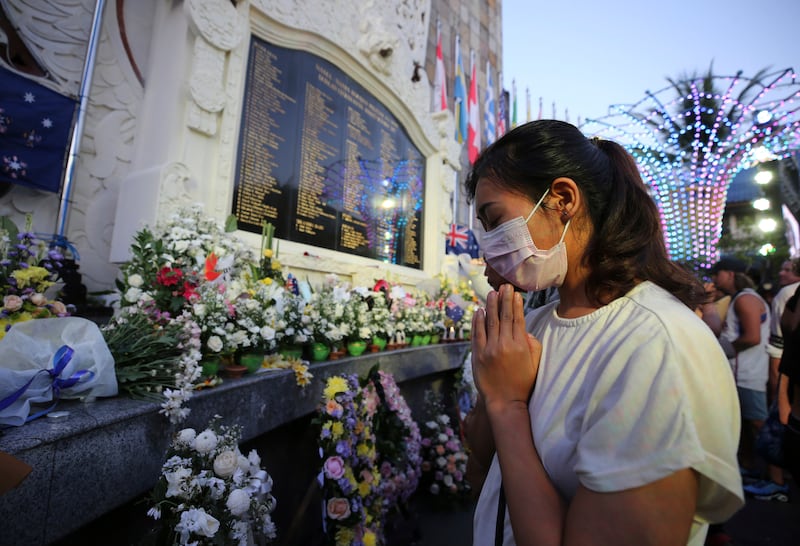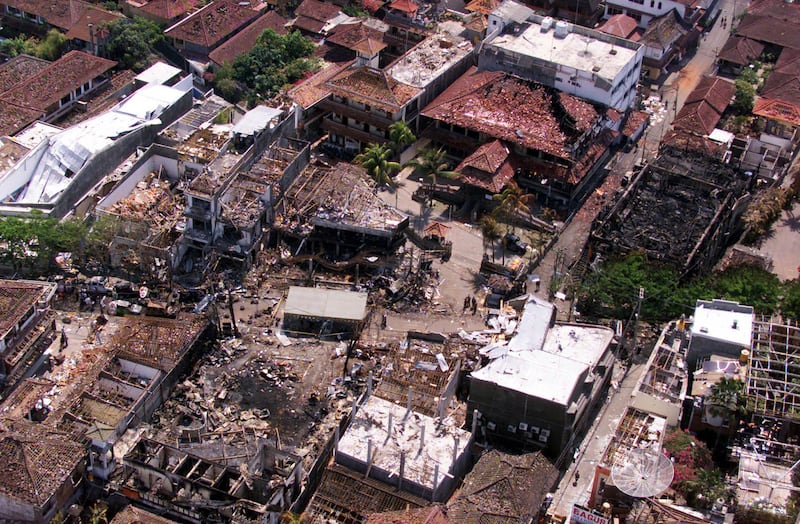The two Malaysian men who pleaded guilty last week to murder for their roles in the 2002 Bali bombings told a military court at Guantanamo Bay on Thursday that they had changed during their more than two decades in U.S. custody.
Mohammed Farik bin Amin and Mohammed Nazir bin Lep entered statements during their sentencing hearing at the Camp Justice courtroom here, a day after relatives of some of the 202 victims killed in the bombings recounted the pain they feel to this day.
A panel of five military officers is expected to determine the defendants’ sentences on Friday at this U.S. Navy base in Cuba.
“I am sorry. I take responsibility for my actions,” bin Amin told the court, adding he was not making an excuse.
During Thursday’s session, his defense attorney presented sketches that bin Amin had drawn and which showed waterboarding and other torture that he claims he endured while in U.S. custody before being sent to Guantanamo Bay in 2006.
“I am not an angry young man anymore,” bin Amin said.
Bin Lep offered a similar statement.
“I am a better person than I was 20 years ago,” he told the panel. “I am learning from my mistakes.”
While both men spoke English, an interpreter had to translate a couple of bin Amin’s phrases for those in the court to understand.

In his courtroom statement, bin Amin said he traveled to Afghanistan before the Bali bombings where he became concerned about Muslims’ suffering across the world. He added that he wanted to defend his faith.
He said he agreed to transfer money in December 2002 to assist some of those involved in the attack that took place on the Indonesian island two months earlier.
“I tell you now I am a better person,” he said as he ended his statement. “I leave it to you to decide” my fate.
Bin Lep
After introducing himself, bin Lep admitted to his crimes. “I’m guilty of my role in the Bali bombings.
“I want to say I am sorry,” he said. “My actions were wrong and I will live with what I did forever.”
Bin Lep, 47, said the bombings occurred when he was “young, immature and stubborn.”
“Only with age and maturity do I fully understand.”
Both bin Lep and bin Amin, 48, noted their efforts to cooperate with prosecutors. Bin Amin said his began in 2014.
For his part, bin Lep said, “I am here to fully cooperate.”
In addition, both said they were tortured following their 2003 arrests in Thailand. Both men were then taken to CIA black sites, where they remained in custody until they were transferred here in 2006, according to a report from a U.S. congressional investigation.
Bin Amin said he did not want to compare what had happened to him while in CIA custody to what had happened to people who were killed or injured in the twin Bali blasts on Oct. 12, 2002.
“I am not trying to compete with the victims,” he said.

Bin Amin’s lead lawyer, Christine Funk, presented a series of drawings he made while in custody in Thailand and at the CIA black site. She asked him questions about the drawings because she said he was not comfortable talking about the torture he endured following his arrest before being sent to Guantanamo.
The first drawing showed a smiling bin Amin.
Several others showed how he was tortured including by being waterboarded. Much of the time he was naked and his hands and ankles were shackled.
One drawing showed someone taking a photo of him as another person looked on. Bin Amin said he was naked and was not allowed to cover himself.
The person “slapped my hand away.”
Bin Lep said he saw the drawings, adding he had faced similar torture. Still, he said, he forgave those who did that to him.
Military officials at the Navy base prohibited reporters from publishing any of those images while reporting on Thursday’s court session. Photography also was prohibited inside the court.
Brothers speak
Earlier in the day, siblings Mohammed Fadil bin Amin and Mohammed Faizal bin Amin spoke out in support of their younger brother. They had arrived at the court on Tuesday, days after prosecutors announced they did not have the proper visas to travel to the U.S.
Fadil bin Amin, the eldest of 10 children, said he listened to the testimonies of victims’ survivors on Wednesday. Farik bin Amin is the family’s sixth child.
“It was the first time I heard such heartbreaking stories,” he said, speaking in English. “I wish I could hug everyone.”
Fadil bin Amin, who lives in Kuala Lumpur, said their parents had taught them to follow their religion. Their mother made sure they prayed, behaved properly, were honest and grew up to be good human beings.
An architect, Fadil bin Amin studied in England while a sister studied in the United States.
He said his parents stressed that “America or the West is a source of opportunity.”
Faizal bin Amin followed his older brother to the witness stand – he is the family’s fifth child.
Fighting back tears during his testimony, Faizal bin Amin said he and his younger brother were close as children.
“We grew up together. We played hide and seek together,” he said.
Faizal bin Amin called his younger brother shy and humble, adding he was the most religious of the 10 siblings.
He said he was pleased that Farik bin Amin took responsibility for his actions, adding he does not know what the consequences may be.
Last week, bin Amin and bin Lep pleaded guilty to murder, conspiracy and three other charges tied to the bombings.
Following their guilty pleas, military Judge Wesley Braun recommended a sentence of 20 to 25 years. The panel, expected to begin deliberations on Friday, is not required to accept the recommendation.
The two men were brought to the U.S. base here in the same year as Encep Nurjaman, an Indonesian national also known as Hambali, the suspected main planner of the Bali attack.
‘Your life has been ruined’
The day began with testimony from Solomon Miller who read a statement from his grandmother. On Wednesday, Miller and his mother, Susanna, both spoke about her brother Dan, 31, who died in the blasts.
Solomon said his mother wrote about Dan’s wonderful legacy – a fund that has raised millions of pounds for adult burn victims.
“Your life has been ruined and is worthless,” he told the two Malaysians, finishing off his grandmother’s statement.
His mother, Susanna, also returned to the stand to read a statement from her sister-in-law, Polly, who married Dan five weeks before the blast. Polly suffered burns over nearly half of her body and lives with constant pain.
Australian Jan Laczynski sent an email to Judge Braun saying he lost five friends in the bombings that “changed my life forever.”
“Please do not discount the memories of these victims by letting these people off with inappropriately light sentences,” he wrote.
“It was our 9/11.”

Laczynski said he often went to the Sari Club many times before the bombing, adding he was advised that his email will be included in evidence for the panel.
He said he had hoped to be able to see the verdict.
“I find it very frustrating that we cannot watch the trial online,” he told a BenarNews reporter in Indonesia.
He said he is “very nervous, hoping the terrorists are still jailed or returned back to Malaysia in jail. It would be insulting if they’re released.”
Ahmad Syamsudin in Jakarta contributed to this report.
